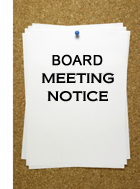Source: Adrian J. Adams Esq.
QUESTION: Can our board meet independently, without the manager present, and without advertising the meetings to discuss, interview, and hire a new management company?

ANSWER: It’s the board’s meeting not the manager’s. So, yes, directors can meet without the manager. However, the board still needs to give notice of the meeting. It may be a little awkward since the manager may suspect or know the purpose of the meeting. Even so, the Davis-Stirling Act does not provide an exemption for awkwardness–only for emergencies.
Interviews. In most instances, the board can simply tell the management company they are unhappy with their performance and plan to interview other companies. If the board is paranoid their manager will sabotage things, it can appoint less than a quorum of directors to interview other companies. The committee can then meet without notice and make a recommendation to the full board for action once it finds the right company.
RECOMMENDATION: Before interviewing other companies, the board should first have legal counsel review the management contract and advise on how best to proceed. Otherwise, the association may find itself in breach of contract and liable for damages.
RECOMMENDATION: Before interviewing other companies, the board should first have legal counsel review the management contract and advise on how best to proceed. Otherwise, the association may find itself in breach of contract and liable for damages.

